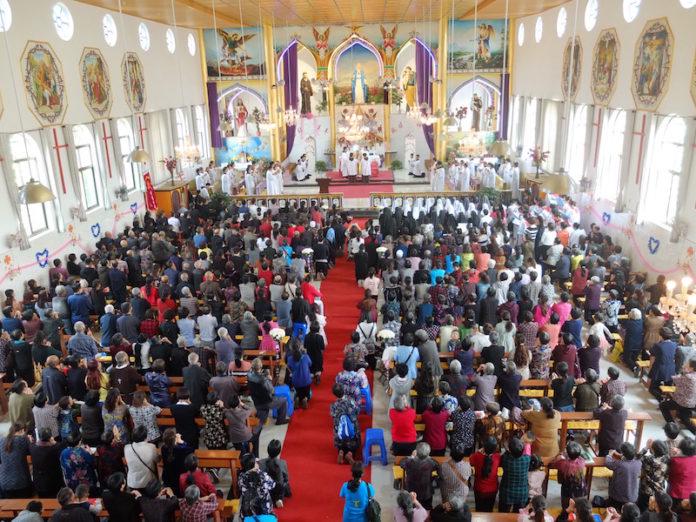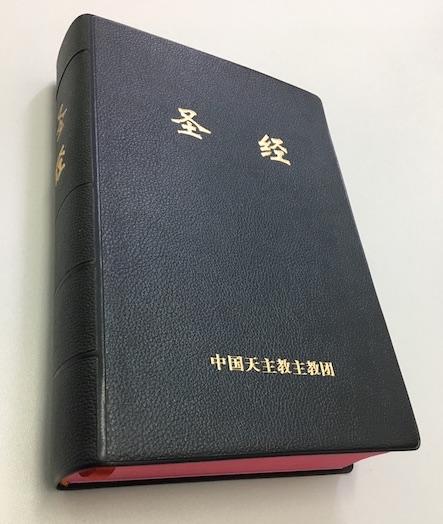China - It was a Bible version that had half its manuscript lost during World War II, saw the Chinese Communist Party coming into power and took three long decades to complete. But since then, it has blessed millions of Chinese Catholics in China and abroad.
This year, we rejoice as the Catholic Church in China celebrates the 50th anniversary of the Studium Biblicum Version.
Published in Hong Kong on Christmas Day in 1968, it is the version recognized and approved by the Catholic Church in China as the authoritative Chinese Catholic Bible.
Brief History of the Bible Translation
The mammoth task of translation was undertaken in 1931 by Franciscan Friar Gabriele Allegra. Inspired by Giovanni di Monte Corvino, who attempted a Bible translation into Chinese in the 14th century, Fr Allegra left his hometown in Italy and arrived in China at age 24 to translate the Bible into the Chinese language.
He later recruited and was joined by more OFM* biblical scholars including some Chinese Friars. Up on the mountainside of Hong Kong Island, the team worked tirelessly in the Studium Biblicum Franciscanum house, translating the Bible from the original Biblical languages.
Among the triple criteria for translation, the primary goal was "faithfulness" to the original text. Second was "fluency" and then "elegance" of expression. Working along these principles, the team painstakingly completed the translation in 1961.
Known as the "Sigao ben" (思高本) in Chinese, its name came from the Chinese transliteration of John Dun Scotus, a prominent 13th century Franciscan theologian, recognized by the Catholic Church alongside with Thomas Aquinas and William of Ockham, whom Fr Allegra admired and was an expert on.
Vatican II and UBS Agreement with Vatican in 1968
Coinciding with the final stages of the monumental translation was a watershed event that took place in Rome, Italy - the Second Vatican Council (1962-1965).
One significant outcome of the Vatican II was Dei Verbum, a Dogmatic Constitution promulgated by Pope Paul VI. The Constitution affirmed the centrality of the Bible in the life of the Church and called for it to be made available in the languages of the people.
Vatican II also opened the door for other languages besides Latin to be used during Mass, hence making Bible translation essential.
Following the Vatican II, the United Bible Societies (UBS) and the Vatican signed a historic agreement known as the Guiding Principles for Interconfessional Cooperation in Translating the Bible in 1968.
With the formation of Catholic Biblical Federation in 1969, the cooperation between UBS and CBF in Biblical ministry continue to develop and strengthen over the years.
As a result, Fr Allegra and his team consulted the Greek New Testament, published by the Bible Societies, when reviewing and revising their translation of the New Testament into Chinese.
UBS Partnership with the Catholic Church in China
After the Cultural Revolution in China in the late 1970s and the re-opening of churches in the 1980s, Studium Biblicum Version was gradually made available in Mainland China in the 1990s.
Since 1994, UBS has been privileged to support the Catholic Church in China in the printing and distribution of the Studium Biblicum Version.
To date, more than 2 million copies of Bible and 1.16 million copies of the New Testament have been printed at Amity Printing Company, out of which 1.65 million copies of Bible and 1.11 million copies of the New Testament are the Studium Biblicum Version supported by UBS.
UBS continues to support the publication and distribution of 50,000 to 100,000 copies of Bible and New Testament annually for the Catholic Church in China. We thank God that the availability of Studium Biblicum Version has met a pressing need for Bibles for personal use as well as in the seminaries, pastoral work and evangelism, leading to further growth and development of the Catholic Church in China.
Today, there are an estimated 12 million Catholics in China with 6 million worshipping in the registered churches. With Catholicism growing in China at an average rate of 100,000 baptisms per year, the need for Bibles continues to grow steadily.
As the Catholic Church in China celebrates half a century of the much cherished Studium Biblicum Version, we pray that God will continue to use it to draw many Chinese to Him!
* OFM stands for Order of the Friars Minor, another name for the Franciscans.
Originally from: UBS China Partnership
CCD reprinted with permission.














